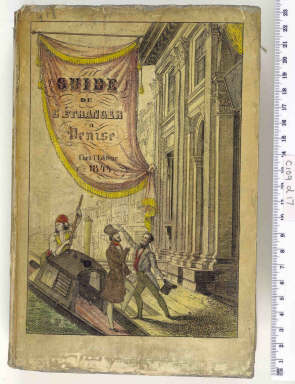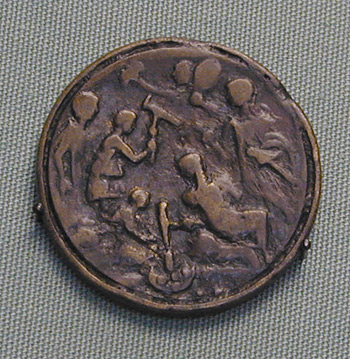



e lu mand vìa.
Stè cìtu dès, mi, l'üfisiànt di müzi,
puezìi növi e ancù mài santìi ài giuvnutìn e ài fiöti i cant.
I rè i fan pagüra a cùi che iàn sùta,
ma dzùra i rè iè Giòve che cumànda.
Lü dop vinsì i Gigànt, a l'è 'l padròn.
Mèc che 'l parpëla e tüt al mond al trëma. A iè chi ad tèra a ià tànti giurnà püsè che tüti i àuti. N'àut ià i sold e pöl guadagnè tüti i vut ca 'l völ.
Cust l'è stimà, ià fàma da èsi unèst.
Cul lu fan putént i tànti cliént.
Ma 'l destìn cun na lége a tüti uguàl
fa sòrti cùi pü àut mè cùi pü bas,
che la so ürna a tén i nom ad tüti.
Se iün i pénd na spà dzùra la tèsta,
a güsta nànca cùli gran pitànsi
che iàvu 'n tàula i famùs Diunìgi
e a fèlu dòrmi i bàsta nén ca 'l sénta
üsèi cantè o 'n gran cuncèrt ad cétri.
'L dòrmi tranquìl dizdégna nén i cà di pòvri cuntadìn, na rìva a l'òmbra e na val andùa 's god na bèla ariëta.
Se iün ià bzògn numèc ad lònch'i bàsta
si che gnu 'nfa lü dal mar an tempèsta,
dl'Artùro che l'è lì che già 'l tramònta o dal cravët che l'è près a muntè 'n cél,
dal vìgni sasinà da la tempèsta,
dla tèra che tradìs parchè al piànti
i mànca l'àqua o dla gran sücìn'a
o dl'invèrn trop frë che fa tüt a zlè.
Fòrsa 'd campè cemént an fond al mar
i san pü nén i pës andùa 'ndè.
L'imprenditùr ansèma i uperàri
cuntìnua a mandè giü di bloc ad màrmu.Fabrichè 'n tèra
l'è pü nén ad mòda.
Ma i so sagrìn ansün siu làsa 'ndré.
E 'ndùa a va 'l padròn e lur i van.
A fianc ad lü 'l sagrìn a pìa 'l mar,
daréra a lü 'lsa grìn mùnta a cavàl.
Favete linguis: carmina non prius
Audita Musarum sacerdos
Virginibus puerisque canto.
Regum timendorum in proprios greges,
Reges in ipsos imperiumst Iovis,
Clari Giganteo triumpho,
Cuncta supercilio moventis.
Est ut viro vir latius ordinet
Arbusta sulcis, hic generosior
Descendat in Campum petitor,
Moribus hic meliorque fama
Contendat, illi turba clientium
Sit maior: aequa lege Necessitas
Sortitur insignis et imos;
Omne capax movet urna nomen.
Destrictus ensis cui super impia
Cervice pendet, non Siculae dapes
Dulcem elaborabunt saporem,
Non avium citharaeque cantus
Somnum reducent. Somnus agrestium
Lenis virorum non humilis domos
Fastidit umbrosamque ripam,
Non zephyris agitata tempe.
Desiderantem quod satis est neque
Tumultuosum sollicitat mare
Nec saevus Arcturi cadentis
Impetus aut orientis Haedi,
Non verberatae grandine vineae
Fundusque mendax, arbore nunc aquas
Culpante, nunc torrentia agros
Sidera, nunc hiemes iniquas.
Contracta pisces aequora sentiunt
Iactis in altum molibus: huc frequens
Caementa demittit redemptor
Cum famulis dominusque terrae
Fastidiosus. Sed Timor et Minae
Scandunt eodem quo dominus, neque
Decedit aerata triremi et
Post equiteni sedet atra Cura.
Quod si dolentem nec Phrygiiis lapis
Nec purpurarum sidere clarior
Delenit usus nec Falerna
Vitis Achaemeniumque costum:
Cur invidendis postibus et novo
Sublime ritu moliar atrium?
Cur valle permutem Sabina
Divitias operosiores?
.
Keep holy silence; strains unknown
Till now, the Muses' hierophant,
I sing to youths and maids alone.
Kings o'er their flocks the sceptre wield;
E'en kings beneath Jove's sceptre bow:
Victor in giant battle-field,
He moves all nature with his brow.
This man his planted walks extends
Beyond his peers; an older name
One to the people's choice commends;
One boasts a more unsullied fame;
One plumes him on a larger crowd
Of clients. What are great or small?
Death takes the mean man with the proud;
The fatal urn has room for all.
When guilty Pomp the drawn sword
sees
Hung o'er her, richest feasts in vain
Strain their sweet juice her taste to please;
No lutes, no singing birds again
Will bring her sleep. Sleep knows no pride;
It scorns not cots of village hinds,
Nor shadow-trembling river-side,
Nor Tempe, stirr'd by western winds.
Who, having competence, has all,
The tumult of the sea defies,
Nor fears Arcturus' angry fall,
Nor fears the Kid-star's sullen rise,
Though hail-storms on the vineyard beat,
Though crops deceive, though trees complain.
One while of showers, one while of heat,
One while of winter's barbarous reign.
Fish feel the narrowing of the main
From sunken piles, while on the strand
Contractors with their busy train
Let down huge stones, and lords
of land affect the sea: but fierce Alarm
Can clamber to the master's side:
Black Cares can up the galley swarm,
And close behind the horseman ride.
If Phrygian marbles soothe not pain,
Nor star-bright purple's costliest wear,
Nor vines of true Falernian strain,
Nor Achaemenian spices rare,
Why with rich gate and pillar'd range
Upbuild new mansions, twice as high,
Or why my Sabine vale exchange
For more laborious luxury?
e la fuggo.
Sia fatto silenzio! per vergini e fanciulli
io, sacerdote delle Muse, canto
poesia che prima non fu udita mai.
Sul loro gregge grava il potere temibile
dei re, ma su questi grava quello
di Giove
che, in gloria per aver vinto i Giganti,
con un cenno solo muove l'universo.
Accade che in solchi piú estesi d'altri un uomo
ordini i suoi alberi, che per candidarsi
scenda in campo chi piú nobile ha il sangue,
che gareggi chi è migliore per costumi
e fama, che abbia un uomo séguito maggiore
di clienti: con imparzialità il destino
estrae a sorte infimi ed illustri:
agita un'urna fonda il nome di tutti.
A chi, sul capo scellerato, inesorabile
pende la spada non procureranno gusto
piacevole i banchetti siciliani,
non daranno il sonno il canto degli uccelli
o il suono della cetra. Dolcemente invece
il sonno predilige le umili case
dei contadini, le pendici ombrose
o le valli dove spirano gli zefiri.
Chi sogna in cuor suo solo ciò che gli basta non diventa ansioso
per il mare in burrasca,
la furia di Arturo quando tramonta
o quella del Capretto quando si leva,
né per le vigne flagellate dalla grandine,
per la delusione del podere, che addebita
ora alle piante, alle piogge, o alle stelle
che bruciano i campi, ora all'inverno crudo.
I pesci avvertono che si restringe il mare
per le dighe di macigni gettati al largo:
con una folla di operai le colmano
pietra su pietra l'impresario e il padrone
infastidito dalla terraferma. Ma
con le dighe salgono timore e minacce,
e un cupo affanno s'abbarbica al bronzo
della nave, segue a spalla il cavaliere.
Ora se un marmo frigio o l'uso della porpora piú splendente degli astri, la vite falerna o un profumo orientale non sollevano chi è prostrato dal dolore, perché mai, seguendo i nuovi costumi, dovrei erigere un grand'atrio con stipiti da fare invidia?
perché dovrei cambiare con ricchezze
piú impegnative la mia valle sabina?